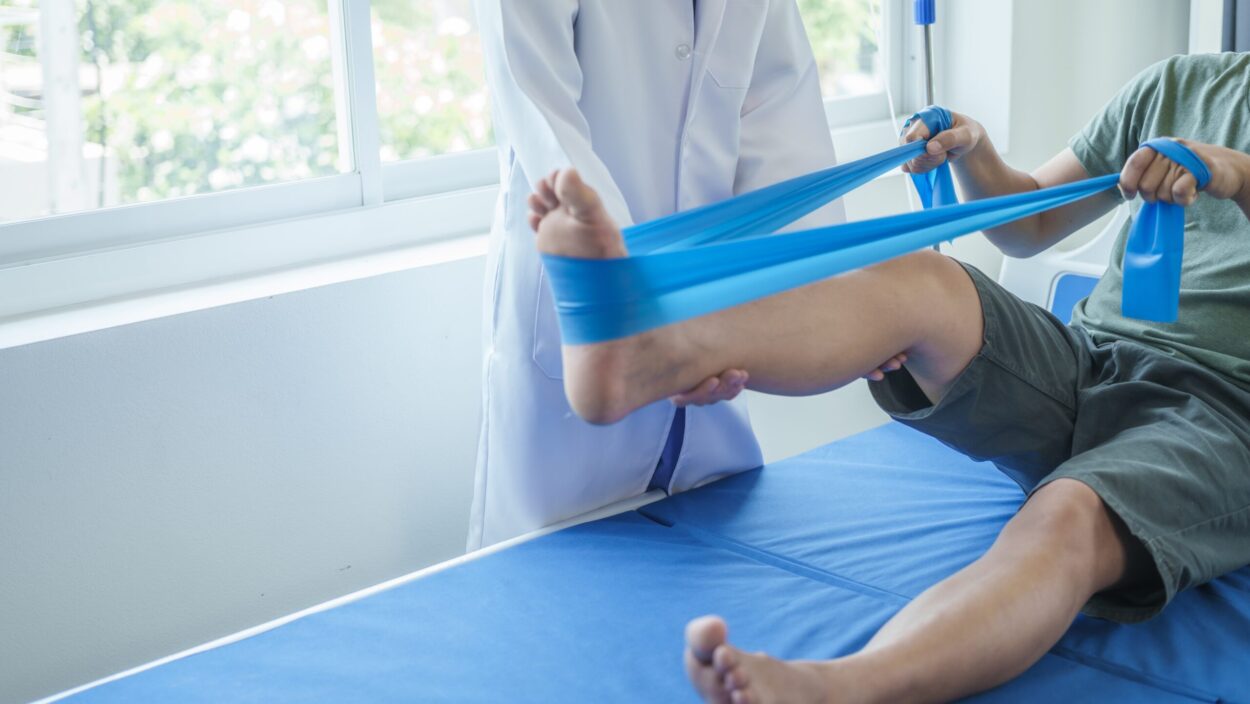 Medically reviewed by Dr Rick Singh – Chief Medical Officer at NextCare. Dr. Rick Singh, Board Certified in Family Medicine and trained in Emergency Medicine, completed his residency at ProMedica Flower Hospital in Ohio. Joining NextCare in 2014, he advanced through leadership roles before becoming Chief Medical Officer in February 2023.
Medically reviewed by Dr Rick Singh – Chief Medical Officer at NextCare. Dr. Rick Singh, Board Certified in Family Medicine and trained in Emergency Medicine, completed his residency at ProMedica Flower Hospital in Ohio. Joining NextCare in 2014, he advanced through leadership roles before becoming Chief Medical Officer in February 2023. 
When it comes to sports, safety is of the utmost importance. Sports physicals are a critical part of ensuring that an athlete is fit and ready for play. It’s important to know what a sports physical entails and where you can get one done – this article will provide all the information you need on sports physicals: what they involve, where to go for them, how much they cost, and additional resources available for athletes or parents who want more information. With so many questions surrounding these tests, we’ll answer “sports physicals what to know” in this blog post!
NextCare is one of the nation’s largest providers of urgent care and occupational medical services. With 170+ clinics in Arizona, Colorado, Kansas, Michigan, Missouri, Nebraska, New Mexico, North Carolina, Oklahoma, Texas, Virginia and Wyoming, we offer exceptional, affordable care to patients across the country.
What is a Sports Physical?
A sports physical is a comprehensive medical exam that helps determine if an athlete is physically fit to participate in a sport. It evaluates the overall health of an individual and identifies any potential risks or underlying conditions that may be present. The goal of the physical is to ensure athletes are safe while participating in their chosen sport.
Definition of a Sports Physical
A sports physical, also known as a pre-participation physical examination (PPE), is an evaluation conducted by a physician or other healthcare provider prior to beginning participation in any type of organized sport activity. This includes school athletics, club teams, intramural leagues, and recreational activities such as running clubs or cycling groups. During this exam, the doctor will assess your overall health status and look for signs or symptoms that could put you at risk during exercise or competition.
Benefits of a Sports Physical
The primary benefit of having a sports physical done before starting any kind of athletic activity is to help identify any existing medical conditions that could increase your risk for injury during exercise or competition. For example, if you have asthma it is important for your doctor to know so they can provide appropriate asthma treatment and managing recommendations before you start playing sports again after taking time off due to illness or injury.
Additionally, having regular checkups with your doctor can help them monitor changes in your health over time which can be beneficial when it comes time for renewing insurance coverage each year since some companies require updated PPEs annually from athletes who wish to remain covered under their policy terms and conditions.
Who Should Get A Sports Physical?
Any athlete who plans on participating in organized sporting activities should get checked out by their healthcare provider beforehand, regardless of age. Even if you don’t plan on competing at the highest level possible but still want to stay active through recreational activities like running clubs or cycling groups, getting checked out first would be wise too. In addition, those with allergies should also consider getting evaluated prior since certain allergens may trigger asthma attacks which could lead to serious complications during intense bouts of exercise without proper management strategies being implemented beforehand (e.g., using inhalers).
A sports physical is an important step in ensuring that athletes are healthy and safe to participate in their sport. Knowing where to get a sports physical can help make sure the process goes smoothly and safely.
Why Is a Sports Physical Necessary?
A sports physical is all about ensuring you or your child can sport safely. It’s an important part of pre-participation physical evaluations, required by many organizations to promote safe sports participation.
At NextCare Urgent Care, our healthcare providers are adept at conducting thorough sports physicals, ensuring athletes meet participation requirements and are fit for their activities.
1. Identifying Underlying Conditions
Some health conditions might need different management during intense physical activity. Certain heart problems, could pose significant risks if not properly addressed. A sports physical allows healthcare providers to identify these and other potential health problems.
What is a physical for sports ultimately going to reveal? It helps your provider monitor growth and development, since weight and height changes might also influence your risk of injury. A sports physical can bring up a medical problem that you weren’t even aware of, preventing a potentially serious injury later. Remember 62 percent of all organized sports injuries happen during practices, and a sports physical may be required to keep kids safe while playing school sports.
2. Preventing Future Injuries
Based on your exam, the healthcare provider can offer personalized recommendations for injury prevention. This can include tips about exercise techniques, conditioning programs, and managing any existing health concerns during athletic participation. MedlinePlus notes that healthcare professionals can offer specific guidance about playing sports with medical conditions.
These screenings can prevent long-term injuries. What is a physical for sports aiming to prevent? Some issues can go unnoticed without a sport-specific medical examination.
3. Meeting Participation Requirements
Many schools and organized sports leagues require sports physicals before allowing participation. A physical demonstrates your capability to participate, minimizing liability issues for the organization. Identifying issues beforehand can prevent injuries or emergency situations. A pre-participation physical can uncover problems affecting your participation.
In some instances, athletes are asked about their sports history, including if they’ve ever lost consciousness, felt nauseated, or felt dizzy. Your medical professional might also review your medical information and vaccination records.
Where to Get a Sports Physical?
A sports physical is an important part of any athlete’s preparation for the upcoming season. It helps to ensure that athletes are healthy and ready to participate in their sport safely. Knowing where to get a sports physical can help make sure that athletes have all the necessary information they need before starting their season.
- ⊕ Urgent Care Centers: Urgent care centers are another option for getting a sports physical done quickly and conveniently without having an appointment with your regular doctor first. Most urgent care centers offer same-day appointments and accept walk-ins, making them ideal for those who need a last minute exam before starting practice or competition. However, it is important to note that these exams may not include all of the tests required by some leagues or organizations so it is always best to check ahead of time if you plan on using this option.
- ⊕ Primary Care Physician or Pediatrician: The most common place for athletes to receive a sports physical is from their primary care physician or pediatrician. These physicians will be familiar with the athlete’s medical history and can provide personalized advice on how best to prepare for the upcoming season. They may also be able to refer athletes to specialists if needed, such as allergists or orthopedic surgeons, depending on what type of sport they are participating in.
There are now several online services available which allow athletes (and parents) access to virtual doctors who can perform remote examinations via video chat software such as Skype or Facetime, as well as through phone calls and email exchanges between patient and doctor. This allows patients greater flexibility when scheduling appointments since there is no need for travel time nor do they have wait times associated with traditional office visits at brick-and-mortar clinics. Additionally, many online services offer discounted rates compared with traditional providers, making them attractive options financially too.
Sports physicals are an important part of any athlete’s health and safety, so make sure to consult with a qualified medical professional for the best results. Next, we’ll look at what you can expect during the exam.
What to Expect During the Exam?
When it comes to a sports physical, there are certain things that you can expect during the exam. Medical history questions and review of current medications is one of the first steps in the process. The doctor will ask about any medical conditions or allergies you may have as well as any medications that you are currently taking. This helps them determine if there are any potential risks associated with participating in sports activities.
Height, weight, blood pressure, and pulse measurements will also be taken during the exam. These help provide an overall picture of your health status and ensure that you’re fit for participation in athletics. Vision and hearing tests may also be conducted to make sure that your eyesight and hearing are up to par for playing sports safely.
The musculoskeletal exam involves testing your range of motion, strength, flexibility, balance, coordination, posture alignment and joint stability which all play a role in how well you perform athletically. The cardiovascular exam includes checking your heart rate at rest as well as after exercise to ensure that everything is functioning properly when engaging in physical activity.
These exams help doctors identify any potential issues before they become more serious problems down the road, so it is important to get regular check-ups even if you do not participate in organized sports activities regularly or competitively on a team basis.
A sports physical is an important part of keeping athletes safe and healthy. Knowing what to expect during the exam can help prepare athletes for their visit and ensure they get the best care possible. Next, we’ll discuss the cost of a sports physical and how insurance may affect it.
Cost of a Sports Physical?
The cost of a sports physical can vary depending on whether or not the patient has insurance coverage. For those with health insurance, many plans will cover the cost of a sports physical. The amount covered may depend on the type and level of coverage as well as any deductibles that need to be met before benefits are applied. It is important for patients to check with their insurance provider prior to scheduling an appointment in order to determine what costs they may be responsible for paying out-of-pocket.
For those without health insurance, there are still options available for obtaining a sports physical at an affordable rate. Many urgent care centers offer discounted rates for uninsured patients who come in seeking medical services such as a sports physical exam. Additionally, some online services provide virtual visits with physicians who can conduct a comprehensive evaluation and provide necessary paperwork needed by schools or athletic organizations if required.
It is important that athletes have access to quality healthcare when participating in organized activities or competitive events where injuries could occur due to strenuous activity or contact between players during competition. A comprehensive sports physical exam helps ensure that athletes are physically fit and able to participate safely, thus minimizing potential risks associated with playing certain types of sports activities.
The cost of a sports physical can vary depending on insurance coverage, out-of-pocket costs, and local resources. With the right information and support, athletes and parents can make informed decisions about athletic training programs that meet their needs.
Sports Physical vs. Annual Physical
While both involve a physical exam, there are key differences:
| Feature | Sports Physical | Annual Physical |
|---|---|---|
| Focus | Evaluates health for safe sports participation | Evaluates overall health and well-being |
| Frequency | Typically annually or as required | Annually |
| Components | Medical history, physical exam, and sports-specific assessments | Medical history, physical exam, vaccinations, developmental milestones |
An annual physical is broader. It evaluates your child’s general health, including growth and development. Annual exams provide preventive care through routine childhood immunizations. Sports physicals focus on factors directly affecting safe participation. This specific aim allows them to target any issues most likely to affect participation.
Additional Resources for Athletes and Parents
For athletes and parents looking for additional resources to help manage allergies or asthma, there are a number of online resources available. Many organizations offer information on proper training techniques and best practices when it comes to managing allergic reactions while playing sports. Additionally, many websites provide helpful tips on how to prevent an allergic reaction from occurring in the first place. For example, the American College of Allergy, Asthma & Immunology (ACAAI) offers comprehensive information about different types of allergies and their symptoms as well as advice on how to avoid triggers that could lead to an attack.
Local organizations also offer athletic training programs specifically designed for athletes with allergies or asthma. These programs often include education sessions on recognizing signs and symptoms of an allergy attack as well as instruction on how to use emergency medications if needed during physical activity. Furthermore, these organizations may provide access to medical professionals who specialize in treating allergic conditions so that athletes can get personalized care tailored towards their individual needs.
Conclusion
Knowing what to expect and where to get a sports physical can help athletes and parents feel more prepared when it comes time for their child’s exam. It is also important to understand the cost associated with sports physicals, as well as additional resources available for athletes and parents. By taking the time to learn about sports physicals, what to know can make all the difference in helping your child stay safe while participating in athletics.
Sports physicals are a critical part of ensuring your child’s health and safety when participating in sports. Knowing the potential side effects of any medications, such as allergies, is essential for proper care.
At NextCare Urgent Care we provide comprehensive sports physicals to help ensure your children’s wellbeing during their time on the field or court. Our experienced medical professionals can advise you on what symptoms to look out for and how best to address them if they arise during playtime. Visit us today so that together we can make sure your kids stay safe while having fun!
FAQs
No, most coaches and sports organizations require a sports physical before allowing athletes to try out or participate in team activities. This requirement helps ensure that all athletes are physically capable of handling the demands of the sport, reducing the risk of injury and ensuring compliance with sports safety regulations.
In a sports physical, the doctor may require a genital exam to ensure there are no conditions that could affect athletic performance or the athlete’s health, such as hernias or infections. This part of the exam is conducted with utmost respect for privacy and professionalism, and you can request a chaperone or discuss any concerns with your doctor beforehand.
The four key components of a physical exam typically include:
- Health History Review: The doctor will ask about the athlete’s medical history, including any past injuries, surgeries, allergies, and current medications.
- Vital Signs Check: This includes measuring blood pressure, heart rate, respiration rate, and temperature to ensure basic health stability.
- Visual Exam: The doctor visually examines the body for signs of existing health issues, such as abnormal skin conditions, posture issues, or physical signs of diseases.
- Physical Tests: These might include tests of flexibility, strength, reflexes, and other physical capabilities that are relevant to athletic performance.
It’s best to wear loose, comfortable clothing and sneakers to a sports physical. This attire will allow for easy movement and accessibility for examining your flexibility and joint mobility. If any specific tests that require additional equipment (like a treadmill for a stress test) are part of the physical, the clinic will inform you beforehand to come appropriately prepared.
A typical sports physical is designed to assess your physical ability to participate in sports and does not include drug screening. However, some schools or organizations may require a separate drug test as part of their sports eligibility criteria.
Sports physicals are typically required annually, but some organizations may have different requirements. It’s important to check with your sports program to determine the frequency with which you need a new physical to remain eligible for participation.
Failing a sports physical can be caused by a variety of medical conditions. These include asthma, allergies, heart problems, diabetes, and other chronic illnesses. Asthma or allergies can cause difficulty breathing during exercise and may require the use of an inhaler to manage symptoms. Heart problems such as high blood pressure or irregular heartbeat can also lead to failing a sports physical. Diabetes requires careful monitoring of blood sugar levels before and after activity in order to prevent complications from developing during exercise. Lastly, any other chronic illness that could be exacerbated by physical activity should be discussed with your doctor prior to taking part in sports activities.
At a sports physical for a girl, the doctor will typically review her medical history and ask questions about any allergies or other health issues. The doctor may also check her heart rate, blood pressure, height and weight. Depending on the sport she is playing, they may also perform vision tests to ensure she can see properly while participating in the activity. They may also do strength and flexibility tests to make sure she is physically fit enough for the sport. Finally, they may provide advice on nutrition and hydration to help keep her healthy during practice and competition.
